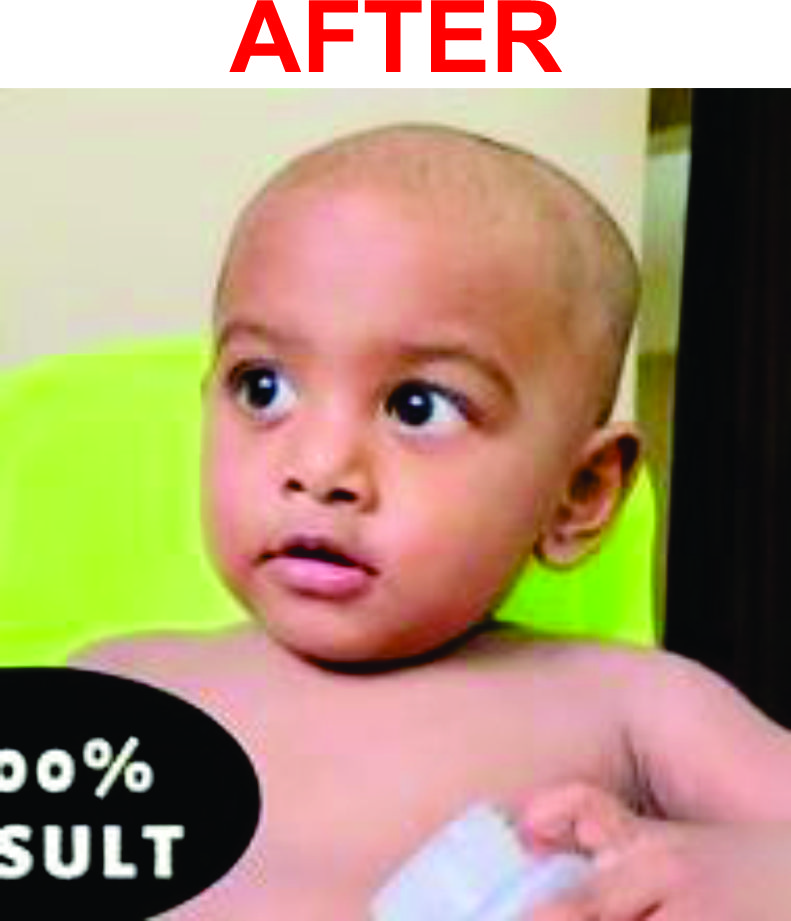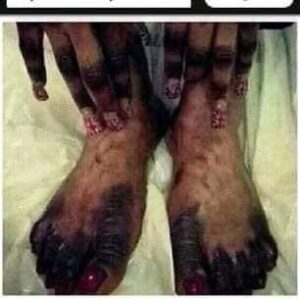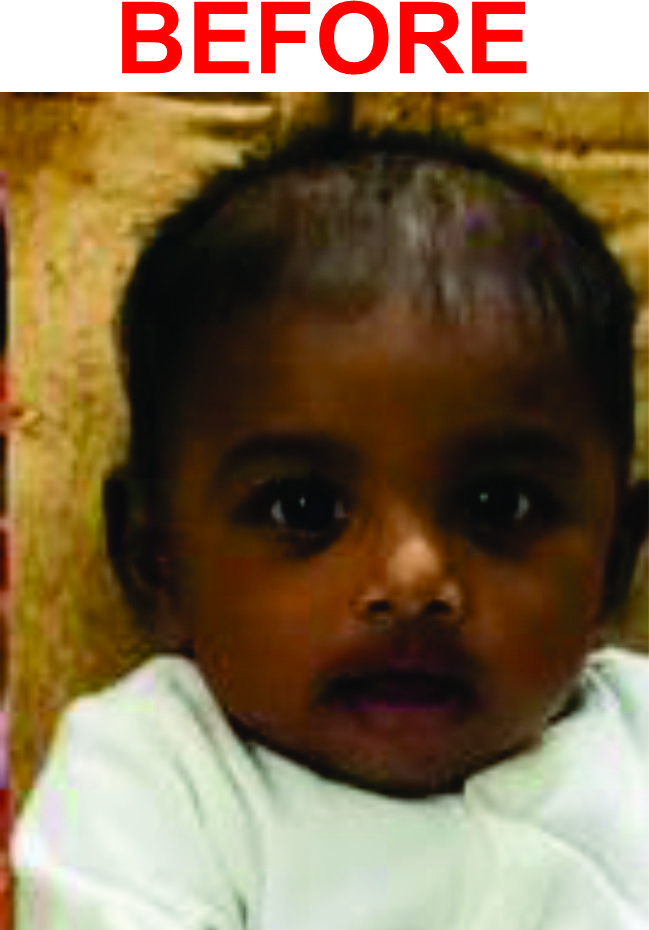•Experts Warn Of Health Implications On Babies
•Rub bleaching creams on babies to change their skin colour
The desperation of many women to produce light complexioned children is assuming a worrisome dimension. Besides applying their personal bleaching creams on their children, many women, including expectant mothers, are said to be taking pills and injections that could whiten their skin and also make their unborn babies come out with light complexion. Experts say the ugly development poses serious dangers to the lives of both the women and their babies. INNOCENT DURU reports.
Michael, a seven-year-old boy, is the delight of everyone he comes across.
He wears punk haircut and sparkles like a bright morning sun from a distance; a situation that endears him to every person who comes across him.
Ironically, Michael was not born with a light complexion. His mother’s quest for a child admired by everyone led her to alter his succulent skin. …CONTINUE READING


“I use Clinic Clear and Vaseline for him. The cream helps to lighten his body and make it glow,” the dark skinned mother said, her face brimming with excitement.
She further explained that the essence of mixing vaseline with Clinic Clear is to reduce the harshness on the son’s face.
“If I don’t add Vaseline to the cream, he will be too fair. A friend gave me the idea because it also works for her child.
“She told me it is better not to use Clinic Clear directly, especially on babies, because it may be too harsh on them.
My son has not had any irritation since I started using it on him and I am always happy to see how people are eager to carry or play with him anywhere I go.”
Clinic Clear, from the description online, is a body lotion for lightening and beautifying skin. It wipes off marks and maintains skin colour. It is commonly used by adults seeking to lighten their complexion.
A review of the cream on
Everythingreviews.com indicates that Clinic Clear is a product of Dodo Cosmetics Togo.
They are the makers of popular whitening creams used by mostly African women.
The review states: “Clinic Clear is a bleaching cream. It contains kojic acid, which is a bleaching ingredient like hydroquinone although it has fewer side effects compared to hydroquinone.”
Continuing, it says the cream “causes the skin to be sensitive, sunburns if used on the face without sunscreen, redness when exposed to sun, heat or extreme light and causes the knuckles to be dark.”
According to everythingreview.com, most bleaching creams in the country are brought from Benin Republic, Togo and adjoining French speaking nations. The prices are relatively cheap compared to more sophisticated products imported from Europe and America.
Like Michael’s mother, many other women also see no harm in using their whitening body lotions on their children whose skin is tender and fragile.
The women’s only concern is to change their babies’ complexions and make them attractive to neighbours and friends.
Another mother, who gave her name simply as Rejoice, said leaving her children with their natural dark complexion makes them appear ugly.
She said: “I sincerely don’t like my children looking dark. They don’t look beautiful and handsome that way.
“That is why I mix my cream with their lotion to make them have brighter complexions.
“Toning is not the same as bleaching, if you must know. People who bleach are those we call Coke and Fanta because some parts of their bodies will be fair while others will be dark.
“But when you tone, your face will look lighter and more charming. This is what I have been doing to make my children look good.
“When you see them, you will wish to have them as your children.”
Another mother who also takes joy in altering the childrens’ complexions said lightening her kids’ complexions with whitening creams presents them as children from a well-to-do home.
The woman, who gave her name simply as Alice, said: “I can’t afford to leave my children’s faces dark. I do not tone other parts of their body but I must tone their faces.
“It is just not possible for me not to lighten their faces. When they look dark, they appear like children that are not catered for by their parents.
“If they are among their peers who have light complexion, they will look odd and unappealing to people.”
Asking rhetorically, she said: “Have you ever attended a public function where children with bright complexion are appreciated and loved by attendees?
“On some occasions, you will see people gazing at such children and wanting to spend time with them as well as showering accolades on the mother. It boosts the self-esteem of such children and their mothers.
“But if your children are looking dark, people will pass unpleasant comments about them: charcoal, baba dudu (dark man), eku dudu (dark rat) and other ridiculous nicknames.
“I really can’t afford to see anyone call or describe my children in such derogatory ways. I will rather tone their skin and boost their look and self-esteem than allow them to look dark and uninspiring.”
Speaking in the same vein, a mother who identified herself simply as Precious said it is not out of place for caring mothers to lighten their children’s skin.
“There is nothing wrong in giving the children’s faces a lift up,” she said.
“Many children’s creams have skin-toning ingredients because the makers know that that is what many parents like.
“Products with such ingredients sell very well. When a mother sees your child’s face toned and glowing, she will want to know what you are using for them.
“Once you say it, they will rush to get such body cream or lotion.”
To make her position very convincing, Precious said: “If you doubt what I am saying, go to cosmetics shops and count the number of children’s skin toning or lightening creams on their shelves.
“Looking good is beautiful, and you can’t have a lightened and glowing skin when your children are looking embarrassingly dark.
“If your children have not eaten but have attractive looks, do you know people will not believe they have not eaten?
Body cream seller shares shocking encounters with mothers
A body cream seller, Mrs Philippine, told our correspondent how difficult it is to advise mothers against using toning creams on their children.
Her words: “I have children who are naturally light complexioned and I use simple regular moisturising body lotions on them.
“When some customers see my children, they will request to know the whitening cream I am using for them.
“When I tell them it is regular moisturising lotion, they will go on and ask for the creams they can use to make their children have light complexion like my children.”
She noted that some of the women making the request have very dark children.
“I am also shocked when they bring their dark complexioned children and ask for creams that can tone their skin.
“When you advise them against it because of future implications, they get angry and go.
“Some will want to buy a whitening lotion and ask if they can use the same for their babies. Once you say no, they will drop it and go, saying they cannot afford to buy different body creams for themselves and their children.
“I am not just out to sell my goods. I am here to offer good advice that will prevent my customers and their children from developing health problems in future.
“It is only a trader that has no conscience that will go on recommending bleaching or whitening lotions for children.”
Manufacturers flood market with bleaching pills, injections
Aside from using bleaching or body whitening creams to enhance children’s complexion, findings showed that many desperate women, including expectant mothers, now either swallow pills or take injections to lighten their complexions and those of their unborn babies.
Some of the pills and injections are on sale on online marketing platforms.
Recently, pregnant Ghanaian women started taking pills during pregnancy to lighten their unborn babies’ skin. The weird practice, according to findings, is spreading like harmattan fire.
The use of the pills by expectant mothers is said to be capable of causing birth defects and damage the limbs and internal organs.
A medical review by Zilpah Sheikh, on WebMD also confirmed that some people use injectable glutathione to lighten their skin or hide dark spots.
It said: “There is very limited evidence that glutathione can change skin pigment.
“What’s more, the FDA in the Philippines, where the practice is popular, warns that injectable glutathione for your skin may be unsafe.
“The agency says it can have toxic effects on the kidneys, liver and nervous system.”
Alarmed by the disturbing development, Ghana’s Food and Drugs Authority (FDA) warned the women against the practice.
The FDA reportedly said the practice of using skin bleaching Glutathione pills has been a growing trend for pregnant women. The FDA asserts that the pills are illegal and can cause birth defects and damage to limbs and internal organs.
The agency says it wants “the general public to know that no product has been approved by the FDA in the form of a tablet to lighten the skin of an unborn child.”
Also sharing her experience on injectable bleaching pills, Philippine, the cosmetics trader, said: “I didn’t know anything of such until recently when a customer (a nurse) told me that a woman asked her to come and fix a drip on her.
“The nurse thought it was for health issues, but after some questioning, she discovered it was for skin lightening.
“At that point, the nurse objected and asked the woman to seek help elsewhere.”
She added: “People are becoming too desperate and crazy to have light complexion.
“Like I said earlier, no amount of warning about the health implications makes sense to them. It is either they have light complexion or nothing.
“The authorities need to do something drastic about this to prevent the looming epidemic.”
Lightening, toning children’s skin should be criminalised- Dermatologist
A consultant dermatologist, Dr Olufolakemi Cole-Adeife, recently described lightening or toning of children’s skin as a child abuse practice capable of damaging internal organs.
Cole-Adeife, a member of the Nigerian Association of Dermatologists based in Lagos, disclosed that the act could cause internal organ damage or dysfunction.
Cole-Adeife added that the act of bleaching children’s skin should be criminalised.
She said that all skin colours were beautiful and should not be tampered with for any reason.
According to her, the infants skin colour is determined by their genetic make up. And if one or both parents are dark-skinned, naturally they will become darker eventually.
The dermatologist condemned the rate at which many parents, especially mothers, mix mercury or steroid-containing tube creams with their children’s cream to make their skin look fairer.
“Mothers, please do not push your insecurity about your skin onto your babies or children.
“I have seen many parents say ‘My baby was very fair when I gave birth to her but now she is getting dark’.
“An infant’s skin colour will certainly change as he or she grows.
“Most times the skin gets darker as they get some sun exposure. This is very normal.
“We are seeing a lot of children now being bleached by their mums, using skin lightening products that are damaging their skin.
“They need to stop this. It is a form of child abuse and should be a crime,” she said.
Cole-Adeife said bleaching children’s skin could lead to long term complications that could hinder the normal growth of children.
She advised mothers to use plain skin care products for their children and stop the craze for skin lightening for children.
“Some of these dangerous creams contain steroids and mercury which can be absorbed into the body through the skin and cause internal organ damage and dysfunction, like brain and kidney impairment and hormonal disruptions.
“You do not want to be battling with the side effects of skin bleaching in somebody who is less than six years.
“This is a serious matter and I know mothers love their children and will not want to harm them.
“So, do not look for maintaining colour skin care products or toning products for your child. Avoid any product that says glowing, toning, lightening or fair for children,“ she said.
Cole-Adeife also pleaded with the National Agency for Food and Drug Administration and Control (NAFDAC) to enforce stricter regulation of children’s skin care products.
She said skin lightening creams for children should be banned or prohibited in the country.
Also speaking generally on the dangers of bleaching in a report, a dermatologist, Akinlolu Siyanbola, warned against the use of bleaching products, saying they could cause kidney failure.
He said consistent usage of bleaching products over a long period could make the kidney fail, adding that it could also cause diabetes.
The dermatologist said bleaching products could also cause osteoporosis (loss of bone density), psychiatric manifestation and systemic hypertension among other ailments.
He said some bleaching products contain chemical agents that reduce the activities of the natural cell that protects the skin from the adverse effects of sunlight.
The agents, he said, change the skin to occhronus, manifested in different colours of the body.
Nigerian women lead other Africans in bleaching
A report by the World Health Organisation (WHO) showed that Nigerian women top the chart of skin bleachers in Africa.
It said 77 per cent of women in the country are bleaching. This staggering figure may have been responsible for the rising number of children with lightened complexion.
Tracing the origin of bleaching in the continent, WHO said: “Skin bleaching in Africa is not a new beauty phenomenon.
“The practice has its roots in the transatlantic slave trade and continued during the European colonization of African nations.
“Skin bleaching and the use of hazardous and potent substances have been linked to a range of adverse effects, from skin diseases to serious systemic problems such as diabetes, hypertension and renal diseases.
“Skin bleaching has become a public health concern, even though the importation and marketing of skin-bleaching products are banned or strictly regulated in many countries.”
WHO regretted that Africans continue to bleach their skin despite the known risk of negative side effects.
“According to reports, skin bleaching for cosmetic purposes is most widespread in African women.
Skin-bleaching, also known as skin lightening, skin toning or skin whitening, is a global cosmetic practice to achieve a lighter skin tone. It is often driven by cosmetic desires rooted in deep historical, economic, socio-cultural and psychosocial factors.
“It involves the use of topical products containing corticosteroids, hydroquinone, mercury, or other agents to lighten the skin.
The use of potentially harmful agents such as mercury, is common in Africa and Asia.”
Shedding light on the prevalence of bleaching in Africa, WHO said:
“In Africa, the prevalence varies significantly, ranging from 25% in Mali to 77% in Nigeria, with other countries reporting intermediate rates: 32% in South Africa, 39% in Ghana, 50% in Senegal and 66% in Congo-Brazzaville.
“In addition, the prevalence of skin bleaching among women in Zimbabwe is 31.15%.
“These statistics highlight the widespread use of skin-lightening products across the continent and show the varying degrees of engagement in skin-bleaching practices in different African regions.
Some bleaching pills and injections on sale
An online search showed that bleaching pills and injectables being sold in the country are numerous. One of common brands of bleaching pills on sale is Glutathione Whitening Pills, Dark Spots & Acne Scar Remover.
The product details show it is made in the USA.
It says the “Whitening Pills will help you get rid of unpleasant dark spots and uneven areas. This process is safe because it is from inside out.”
Providing information on the antioxidants strength, it said: “These skin bleaching pills contain 5000 mg pf glutathione, an antioxidant that will help protect you from free radicals.
“With our anti-aging effect with perfect balance you can feel young, tightened and fresh again.
“Glutathione pills do not contain harmful substances. Our formula was created in the USA following the highest American standards.”
Writing under the heading “Bleaching for everyone, the product details said: “No matter what kind of skin problems you have, Glutathione Whitening Pills work systematically on all problem areas of skin.”
The medical review on WebMD by Zilpah Sheikh, said: “There’s no standard dosage for oral glutathione. In most studies, people take daily amounts in the range of 250-1,000 milligrams.
“Oral glutathione is controversial in the medical community. Some research suggests your body may not effectively use the pill. But other studies have found glutathione taken by mouth may raise glutathione levels in your body.”
It added that “taking glutathione long-term has been linked to lower zinc levels. Inhaled glutathione may trigger asthma attacks in people who have asthma. Symptoms may include wheezing.”
Online findings further showed that Glutathione injections are also used for skin whitening.
An AI result said: “Skin whitening injections, also known as glutathione injections, are a cosmetic procedure that can help even out skin tone and reduce the appearance of dark spots, acne, and scars.
Explaining how it works, it said “Glutathione injections reduce melanin production, the pigment that gives skin its colour. Glutathione is also an antioxidant that helps protect skin cells from damage.
“In addition to skin whitening, glutathione injections can: Improve skin radiance, detoxify the skin, rejuvenate the skin, and improve the appearance of psoriasis bumps.
Glutathione is injected directly into the bloodstream for maximum absorption. Injections are usually given 1–3 times a week.”
Healthwire, an online website, said if a patient receives a dosage of Glutathione Skin Whitening Injections that is significantly more than what is necessary, they risk experiencing catastrophic adverse effects like kidney failure or blood poisoning.
NAFDAC decries proliferation of bleaching cream
The National Agency for Food and Drug Administration and Control (NAFDAC) has raised the alarm over a proliferation of “dangerous” and “unregulated” bleaching creams in the market which it likened to a pandemic.
The agency, recently during its ‘Media Sensitization Workshop on the Dangers of Bleaching Creams and Regulatory Controls’ held in Port Harcourt, the Rivers State capital lamented the health threats accompanying long-term use of dangerous agents and urged Nigerian women to be proud of their skin colour, saying, “There’s no need to bleach.”
The Director General of the agency, Prof. Mojisola Adeyeye, who was represented by the Director of Chemical Evaluation and Research, Dr Patrick Leonard Omokpariola, stated that the products are now marketed under different names for sales purposes.
NAFDAC Deputy Director, Ebele Anto, also canvassed the support of the media to sensitise Nigerians to the notion that there is nothing wrong with being dark-skinned.
-The Nation



